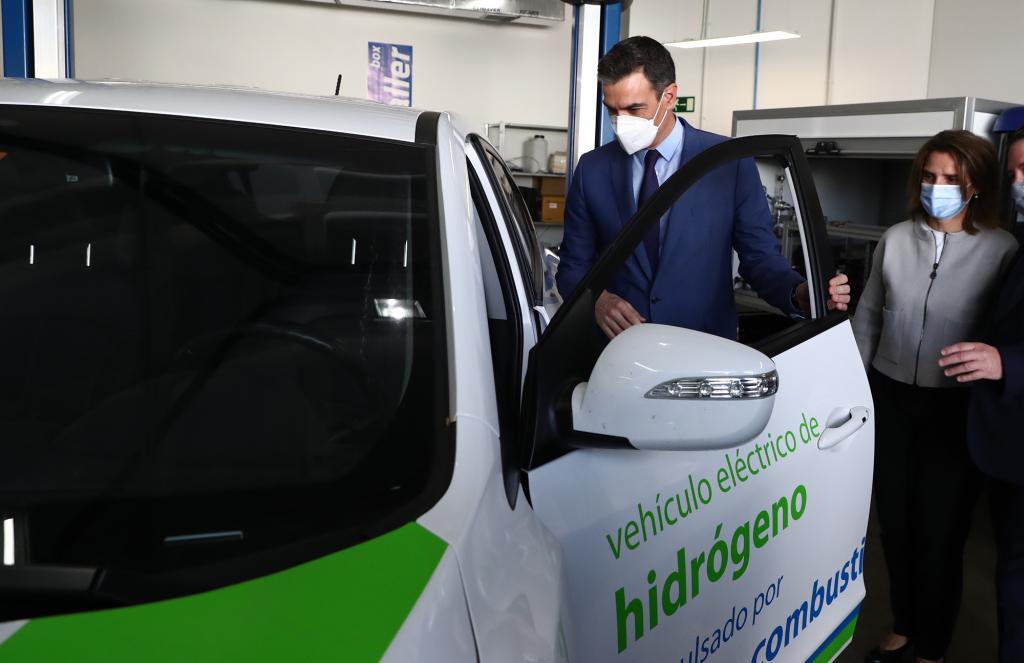Thessaloniki gets ready for its metro launch in November
The underground rapid transit lines have been under construction for almost two decades due to various project delays
 TheMayor.EU logo
TheMayor.EU logo 
Pedro Sanchez during his visit at the National Hydrogen Centre in Puertollano, Source: Pool Moncloa / Fernando Calvo
Somehow, both hydrogen and wine became the subject of political statements
On 16 February, Spanish Prime Minister Pedro Sanchez paid a visit to the city of Puertollano, located in Castilla-La Mancha and known in the country as a traditional hub for the energy industry sector thanks to the oil refineries there.
The goal of the government is to divorce the image of the city from the processing of fossil fuels and make it a pioneering place for the new technologies emerging in that field. For this purpose, since 2008, the Spanish National Hydrogen Centre (CNH2) has been hosted there with the mission to research and develop hydrogen conversion as an energy source for fuel cells.
Prime Minister Sanchez took the opportunity to emphasize the importance of having such a facility and how this creates a positive image of the country in terms of sustainable development along the right lines. This served as a sign of support for the centre, which was more than symbolic, as the PM promised that 40% of the investment derived from European funds will go to CNH2.
"I have no doubt that with centres like this we are going to take advantage of this opportunity to make that leap to modernity in our economy. If we maintain this firm commitment to the energy transition, Spain can achieve the dream of becoming a country that exports cheap and clean energy," Sánchez pointed out.
Emiliano García-Page, the regional President of Castilla-La Mancha, played host to the high-level visitor. He also praised the potential of hydrogen for the economic development of the country, highlighting the fact that all the regional public administration buildings are powered by renewable energy already.
Mr García-Page, however, clearly had more on his mind as he also used the opportunity to comment on a recent amendment passed by the European Parliament. The legislature decided not to put warning labels about the cancer risk associated with excessive consumption of alcohol due to some considerable Spanish lobbying.
This happened in the framework of the debate on the Plan to Fight Cancer drawn up by the European Commission. In this sense, García-Page stated that "it is a good day for this enormous product and this enormous culture" that constitutes the wine industry, very specifically in Castilla-La Mancha, a region that produces "9 percent of all the wine on the planet”, in his words.
The meeting between the two leaders, thus, aptly summarized in one go Spain’s ambitions for the future but also its fears of losing traditional industries, which have become part of its cultural identity.

The underground rapid transit lines have been under construction for almost two decades due to various project delays

Now you can get your wine in Talence by paying directly in Bitcoin

That’s because the state has to spend money on updating the railway infrastructure rather than subsidizing the cost of the popular pass

Rethinking renewable energy sources for the urban landscape

The examples, compiled by Beyond Fossil Fuels, can inform and inspire communities and entrepreneurs that still feel trepidation at the prospect of energy transition

Now you can get your wine in Talence by paying directly in Bitcoin

The 10th European Conference on Sustainable Cities and Towns (ESCT) sets the stage for stronger cooperation between the EU, national and local level to fast track Europe's transition to climate neutrality.

At least, that’s the promise made by the mayor of Paris, Anne Hidalgo

The underground rapid transit lines have been under construction for almost two decades due to various project delays

At least, that’s the promise made by the mayor of Paris, Anne Hidalgo

Hostal de Pinós is located in the geographical centre of the autonomous region

Despite its church-y name, the district has long been known as the hangout spot for the artsy crowds

Urban dwellers across the EU are having a say in making their surroundings friendlier to people and the environment.

Forests in the EU can help green the European construction industry and bolster a continent-wide push for architectural improvements.

Apply by 10 November and do your part for the transformation of European public spaces

An interview with the Mayor of a Polish city that seeks to reinvent itself

An interview with the newly elected ICLEI President and Mayor of Malmö

A conversation with the Mayor of Lisbon about the spirit and dimensions of innovation present in the Portuguese capital














